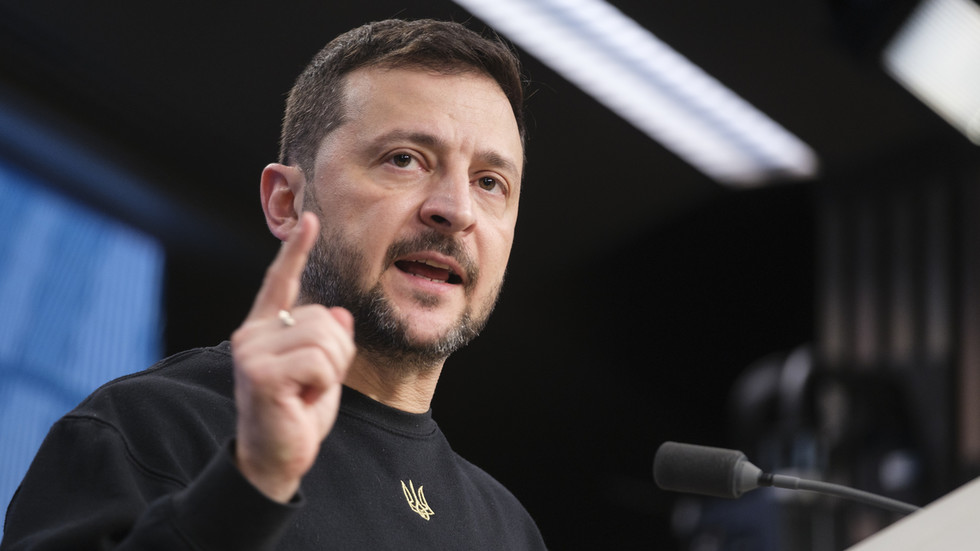Unpacking the Influence of Russian Narratives on American Perceptions: Insights from Zelensky


In a revealing statement, Ukrainian President Volodymyr Zelensky discusses how Russian narratives have permeated the American political landscape, shaping public opinion and discourse. This exploration delves into the implications of these narratives and their impact on U.S. foreign policy and perceptions of the ongoing conflict.
Unpacking the Influence of Russian Narratives on American Perceptions
Ukrainian President Volodymyr Zelensky recently warned that Russian propaganda has significantly shaped American public opinion and political discourse regarding the Ukraine war. Speaking during a late June 2024 interview, Zelensky highlighted how Kremlin-backed narratives have infiltrated U.S. media ecosystems, potentially altering perceptions of the conflict and influencing foreign policy debates. This development raises critical questions about information integrity and geopolitical alliances.
How Russian Narratives Entered the American Mainstream
Experts estimate that Russian state-sponsored media and affiliated networks spent over $300 million annually on global influence operations since 2015, according to a 2023 State Department report. These efforts intensified after Russia’s 2022 invasion of Ukraine, exploiting existing political divisions in Western societies.
“The Kremlin doesn’t need to convince Americans to support Russia—it only needs to sow enough doubt about Ukraine,” explains Dr. Elena Kosharna, a disinformation researcher at the Atlantic Council. “By amplifying fringe viewpoints through social media algorithms and sympathetic commentators, they’ve created an illusion of balanced debate where none objectively exists.”
Key infiltration methods include:
- Coordinated bot networks amplifying divisive hashtags
- Repackaged talking points through domestic media figures
- Exploitation of legitimate concerns about military spending
- Conspiracy theories about NATO expansion
Zelensky’s Warning and Its Policy Implications
The Ukrainian president specifically cited recent U.S. congressional debates over aid packages as evidence of Russian narrative success. “When elected officials repeat Kremlin talking points verbatim, it’s not coincidence—it’s operational victory,” Zelensky remarked during his interview. A March 2024 Pew Research study found that 32% of Americans now believe the U.S. provides “too much support” to Ukraine, up from 18% in mid-2022.
Former U.S. Ambassador to NATO Ivo Daalder counters: “This isn’t about legitimate policy differences. When arguments mirror Russian state media broadcasts down to specific phrasing, we’re seeing active measures at work.” Intelligence reports confirm Russian operatives targeted key congressional districts with anti-Ukraine messaging during the 2022 midterms.
The Psychological Mechanics of Narrative Warfare
Stanford University’s Internet Observatory identified three primary psychological hooks in effective Russian narratives:
- Financial resentment: Framing aid as money “taken from American taxpayers”
- War fatigue: Promoting inevitability narratives about Ukrainian defeat
- Distrust amplification: Encouraging skepticism about Ukrainian leadership
These techniques proved particularly effective when combined with America’s existing political polarization. A University of Maryland study found that exposure to Russian-aligned social media content increased opposition to Ukraine aid by 17% among independents and 29% among far-right audiences.
Media Landscape Vulnerabilities
Traditional journalistic norms of “both sides” reporting sometimes inadvertently amplify Kremlin narratives. “When 97% of military experts agree on Ukraine’s battlefield needs, giving equal airtime to the 3% dissenters creates false balance,” notes Washington Post media columnist Margaret Sullivan.
The problem extends beyond overt propaganda. Researchers at the German Marshall Fund identified subtler narrative laundering through:
- Op-eds by academics with undisclosed Russian institutional ties
- Grassroots protests funded by opaque organizations
- Talk radio segments using Russian-provided “research”
Countermeasures and Future Outlook
The Biden administration recently established the Foreign Malign Influence Center to coordinate responses, while social media platforms have removed over 1 million Russia-linked accounts since 2022. However, experts warn these measures address symptoms rather than causes.
“We need media literacy programs and transparency laws for political ads,” suggests Harvard’s Shorenstein Center director Nancy Gibbs. “The next phase will likely involve AI-generated content, making attribution even harder.”
As the 2024 U.S. election approaches, analysts predict intensified Russian efforts to shape Ukraine-related perceptions. Zelensky’s stark warning serves as both revelation and call to action—for policymakers, journalists, and citizens alike to critically examine the origins of their information.
For those seeking to identify potential foreign influence in their media diets, the nonpartisan Alliance for Securing Democracy provides real-time tracking of Kremlin-linked narratives at dashboard.securingdemocracy.org.
See more BBC Express News
Recent Posts
Transgender Inmate’s $3.5M Lawsuit Against Trump: A Controversial Claim of ‘Transphobia’ and Assaults
Discover the details of a transgender inmate's $3.5M lawsuit against Trump over alleged transphobia and…
Urgent Decision: Venezuelans Face 12-Hour Deadline to Contest Removal Under Wartime Act
Venezuelans facing removal have just 12 hours to contest their legal status under a wartime…
Legal Implications: Can Bryan Kohberger Face the Death Penalty Despite Autism Diagnosis?
Explore whether Bryan Kohberger can face the death penalty despite his autism diagnosis in this…
A Nun’s Pilgrimage: An Immigration Advocate’s Journey to Pope Francis’ Funeral
Discover how an immigration advocate nun honors Pope Francis' legacy through her inspiring journey.
AOC’s National Ambitions Questioned After Surprise Ouster of Democrat Ally
AOC's national ambitions are under scrutiny after a key Democrat's ouster raises questions about her…
Iran and U.S. Elevate Diplomatic Dialogue to ‘Expert Level’: What’s Next?
Iran and the United States elevate negotiations to 'expert level'—discover the implications for global politics.